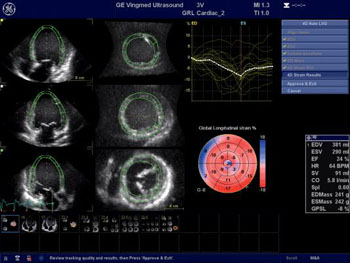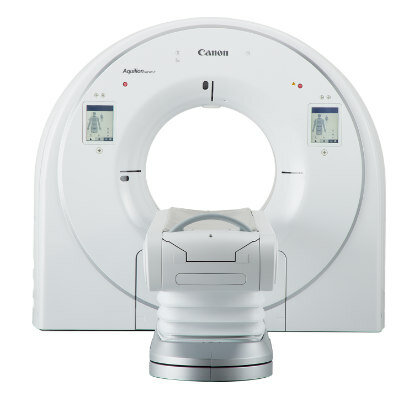Strain Echocardiography Predicts Hypertrophic Cardiomyopathy Risk
|
By MedImaging International staff writers Posted on 30 Jun 2016 |

Image: Researchers found using strain echocardiography could accurately predict which patients were likely to have complications from hypertrophic cardiomyopathy (Photo courtesy of GE / JHU).
A new study shows that strain echocardiography can accurately predict which patients are likely to have complications resulting from hypertrophic cardiomyopathy (HCM).
Researchers at Johns Hopkins University (JHU, Baltimore, MD, USA) conducted a study in 400 HCM patients who were followed for 37 months, and who underwent both conventional and strain echocardiography to obtain global longitudinal strain (GLS) data, an objective and reproducible imaging modality than can be used to quantify subtle disturbances in left ventricular (LV) function by detecting sub-endocardial contractility and viability, which often precede an overt impairment of LV function, as measured by ejection fraction (EF).
The results showed that GLS measured by strain echocardiography can be used as a cardiovascular diagnostic technique that is a sensitive and powerful way to assess patient HCM outcomes, which are a common, but often undetected, leading cause of sudden cardiac death (SCD) in young adults. The study was presented as a poster session at the American Society of Echocardiography (ASE) 27th annual scientific sessions, held during June 2016 in Seattle (WA, USA).
“HCM is the most common inherited cardiac condition, with several disabling and life-threatening complications. Global longitudinal strain was able to independently predict key outcomes in HCM, and therefore has the potential to become an essential tool in HCM risk assessment,” said lead author and study presenter Hongyun Liu, MD, of the JHU HCM Center of Excellence.
HCM is a primary disease of the myocardium in which a portion of it becomes hypertrophic without any obvious cause, creating functional impairment of the cardiac muscle. It is a leading cause of SCD in young athletes, and indeed in any age group, and a cause of disabling cardiac symptoms. HCM is frequently asymptomatic until SCD, and for this reason some suggest routinely screening certain populations for this disease, as the prevalence is about 0.2% to 0.5% of the general population.
Related Links:
Johns Hopkins University
Researchers at Johns Hopkins University (JHU, Baltimore, MD, USA) conducted a study in 400 HCM patients who were followed for 37 months, and who underwent both conventional and strain echocardiography to obtain global longitudinal strain (GLS) data, an objective and reproducible imaging modality than can be used to quantify subtle disturbances in left ventricular (LV) function by detecting sub-endocardial contractility and viability, which often precede an overt impairment of LV function, as measured by ejection fraction (EF).
The results showed that GLS measured by strain echocardiography can be used as a cardiovascular diagnostic technique that is a sensitive and powerful way to assess patient HCM outcomes, which are a common, but often undetected, leading cause of sudden cardiac death (SCD) in young adults. The study was presented as a poster session at the American Society of Echocardiography (ASE) 27th annual scientific sessions, held during June 2016 in Seattle (WA, USA).
“HCM is the most common inherited cardiac condition, with several disabling and life-threatening complications. Global longitudinal strain was able to independently predict key outcomes in HCM, and therefore has the potential to become an essential tool in HCM risk assessment,” said lead author and study presenter Hongyun Liu, MD, of the JHU HCM Center of Excellence.
HCM is a primary disease of the myocardium in which a portion of it becomes hypertrophic without any obvious cause, creating functional impairment of the cardiac muscle. It is a leading cause of SCD in young athletes, and indeed in any age group, and a cause of disabling cardiac symptoms. HCM is frequently asymptomatic until SCD, and for this reason some suggest routinely screening certain populations for this disease, as the prevalence is about 0.2% to 0.5% of the general population.
Related Links:
Johns Hopkins University
Latest Radiography News
- Novel Breast Imaging System Proves As Effective As Mammography
- AI Assistance Improves Breast-Cancer Screening by Reducing False Positives
- AI Could Boost Clinical Adoption of Chest DDR
- 3D Mammography Almost Halves Breast Cancer Incidence between Two Screening Tests
- AI Model Predicts 5-Year Breast Cancer Risk from Mammograms
- Deep Learning Framework Detects Fractures in X-Ray Images With 99% Accuracy
- Direct AI-Based Medical X-Ray Imaging System a Paradigm-Shift from Conventional DR and CT
- Chest X-Ray AI Solution Automatically Identifies, Categorizes and Highlights Suspicious Areas
- AI Diagnoses Wrist Fractures As Well As Radiologists
- Annual Mammography Beginning At 40 Cuts Breast Cancer Mortality By 42%
- 3D Human GPS Powered By Light Paves Way for Radiation-Free Minimally-Invasive Surgery
- Novel AI Technology to Revolutionize Cancer Detection in Dense Breasts
- AI Solution Provides Radiologists with 'Second Pair' Of Eyes to Detect Breast Cancers
- AI Helps General Radiologists Achieve Specialist-Level Performance in Interpreting Mammograms
- Novel Imaging Technique Could Transform Breast Cancer Detection
- Computer Program Combines AI and Heat-Imaging Technology for Early Breast Cancer Detection
Channels
MRI
view channel
Low-Cost Whole-Body MRI Device Combined with AI Generates High-Quality Results
Magnetic Resonance Imaging (MRI) has significantly transformed healthcare, providing a noninvasive, radiation-free method for detailed imaging. It is especially promising for the future of medical diagnosis... Read more
World's First Whole-Body Ultra-High Field MRI Officially Comes To Market
The world's first whole-body ultra-high field (UHF) MRI has officially come to market, marking a remarkable advancement in diagnostic radiology. United Imaging (Shanghai, China) has secured clearance from the U.... Read moreUltrasound
view channel
Super-Resolution Imaging Technique Could Improve Evaluation of Cardiac Conditions
The heart depends on efficient blood circulation to pump blood throughout the body, delivering oxygen to tissues and removing carbon dioxide and waste. Yet, when heart vessels are damaged, it can disrupt... Read more
First AI-Powered POC Ultrasound Diagnostic Solution Helps Prioritize Cases Based On Severity
Ultrasound scans are essential for identifying and diagnosing various medical conditions, but often, patients must wait weeks or months for results due to a shortage of qualified medical professionals... Read more
Largest Model Trained On Echocardiography Images Assesses Heart Structure and Function
Foundation models represent an exciting frontier in generative artificial intelligence (AI), yet many lack the specialized medical data needed to make them applicable in healthcare settings.... Read more.jpg)
Groundbreaking Technology Enables Precise, Automatic Measurement of Peripheral Blood Vessels
The current standard of care of using angiographic information is often inadequate for accurately assessing vessel size in the estimated 20 million people in the U.S. who suffer from peripheral vascular disease.... Read moreNuclear Medicine
view channelNew PET Agent Rapidly and Accurately Visualizes Lesions in Clear Cell Renal Cell Carcinoma Patients
Clear cell renal cell cancer (ccRCC) represents 70-80% of renal cell carcinoma cases. While localized disease can be effectively treated with surgery and ablative therapies, one-third of patients either... Read more
New Imaging Technique Monitors Inflammation Disorders without Radiation Exposure
Imaging inflammation using traditional radiological techniques presents significant challenges, including radiation exposure, poor image quality, high costs, and invasive procedures. Now, new contrast... Read more
New SPECT/CT Technique Could Change Imaging Practices and Increase Patient Access
The development of lead-212 (212Pb)-PSMA–based targeted alpha therapy (TAT) is garnering significant interest in treating patients with metastatic castration-resistant prostate cancer. The imaging of 212Pb,... Read moreGeneral/Advanced Imaging
view channel
Radiation Therapy Computed Tomography Solution Boosts Imaging Accuracy
One of the most significant challenges in oncology care is disease complexity in terms of the variety of cancer types and the individualized presentation of each patient. This complexity necessitates a... Read more
PET Scans Reveal Hidden Inflammation in Multiple Sclerosis Patients
A key challenge for clinicians treating patients with multiple sclerosis (MS) is that after a certain amount of time, they continue to worsen even though their MRIs show no change. A new study has now... Read moreImaging IT
view channel
New Google Cloud Medical Imaging Suite Makes Imaging Healthcare Data More Accessible
Medical imaging is a critical tool used to diagnose patients, and there are billions of medical images scanned globally each year. Imaging data accounts for about 90% of all healthcare data1 and, until... Read more
Global AI in Medical Diagnostics Market to Be Driven by Demand for Image Recognition in Radiology
The global artificial intelligence (AI) in medical diagnostics market is expanding with early disease detection being one of its key applications and image recognition becoming a compelling consumer proposition... Read moreIndustry News
view channel
Hologic Acquires UK-Based Breast Surgical Guidance Company Endomagnetics Ltd.
Hologic, Inc. (Marlborough, MA, USA) has entered into a definitive agreement to acquire Endomagnetics Ltd. (Cambridge, UK), a privately held developer of breast cancer surgery technologies, for approximately... Read more
Bayer and Google Partner on New AI Product for Radiologists
Medical imaging data comprises around 90% of all healthcare data, and it is a highly complex and rich clinical data modality and serves as a vital tool for diagnosing patients. Each year, billions of medical... Read more


















